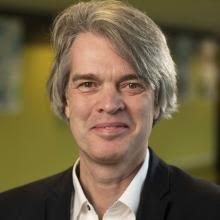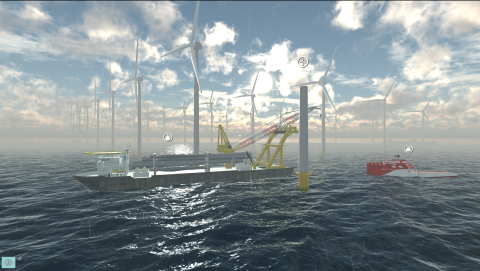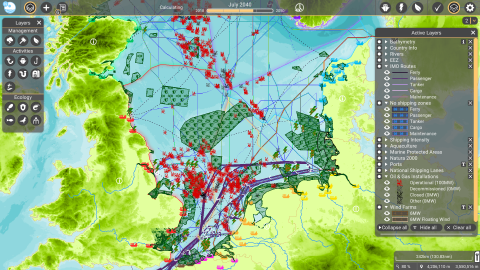Serious Games and Digital Twins
By playing a serious game, policy makers learn how to spatially plan the North Sea in the coming decades; to find a balance between human activities such as fishing, shipping and wind farms, and ecology. Policy makers and stakeholders from different countries around the North Sea take spatial decisions together in a digital game environment - the Maritime Spatial Planning (MSP) Challenge (www.mspchallenge.info). Simulations and visualizations show the spatial consequences. This is one of the examples of serious gaming that Igor Mayer uses to teach organizations to make good, long-term policy decisions. Mayer is endowed professor of Playful Organizations & Learning Systems at Tilburg School of Social and Behavioral Sciences and specializes in serious gaming.
What exactly does your research involve?
"My research focuses on the design, application and investigation of game technology, game design and game concepts to enable organizations and complex systems to learn. The Department of Organization Studies (OS) has a tradition in the field of game simulations and serious gaming. Game is an important method for organizational research and organizational change. But Interactive Technologies are developing at a rapid pace, think 3D visualization, game AI, Virtual and Augmented Reality. Serious games are becoming more data-driven, more intelligent and more immersive. They are evolving into Digital Twins - digital or virtual copies of a socio-technical system. Among other things, we investigate the use and effects of games and Digital Twins on policy and decision making.’

The power of play, of serious games, lies in its ability to bring about social learning
Igor Mayer - endowed professor of Playful Organizations & Learning Systems
What do organizations gain from this in concrete terms?
‘Like all models, Serious Games and Digital Twins are a simplification of reality. But now that we have much more data and computing power (AI), we can make simulations very powerful and visualizations very realistic. For example, the EU is funding the development of a Digital Twin for the European Seas - a Green Deal project called ILIAD. We are involved in that as a partner because of our knowledge and experience in the field of games. There is even an Earth Digital Twin in development, for climate change research and policy. Regionally, urban Digital Twins are high on the agenda, also in Brabant. Yet a Digital Twin does not guarantee better decision-making. A Digital Twin is sometimes presented as a control room, but in my opinion it is not. Certainly not when it comes to ecosystems, such as the sea. There is a danger that what is not, or difficult to capture in Data or AI, will not be included in the Digital Twin, nor in policy making. Digital Twins are therefore better used to teach policymakers, scientists and stakeholders about the system they themselves are part of. This can be done by letting them 'play' with the data and simulations. The power of play, of serious games, lies in its ability to bring about social learning.’


Does technology offer answers to the questions of the future?
'A lot of attention goes to the engineering side of digital technology. It's everywhere, Data and AI that's punching the clock. But it's not just about how we make these intelligent systems, but more importantly how we use them responsibly and meaningfully. How we embed smart systems like Digital Twins into existing organizations and build institutions around them. What do we use them for? Who is at the controls? These are important questions for the humanities and social sciences, where Tilburg University distinguishes itself. These are questions that Tilburg economists, lawyers, philosophers, psychologists, management consultants and organizational scientists can address together. I think Interactive Technology and especially 'play' is an important way to learn, also to deal responsibly with Data and AI.'
Biography Igor Mayer
Igor Mayer (1965, Detmold, Germany) has been appointed as an endowed professor of Playful Organizations & Learning Systems in the Department of Organization Studies (OS) of the Tilburg School of Social and Behavioral Sciences as of January 1, 2021. The establishing body is Breda University of Applied Sciences (BUas) where Igor Mayer is currently a Lector in the field of Serious Games, Innovation & Society. Since 2017, he has been a visiting professor at the Department of Public Administration, Dalian University of Technology, China.
Mayer studied Administration and Policy Sciences at Radboud University Nijmegen (1984-1991). After his military service, he worked (combined with positions at TNO and IVA Policy Research and Advice) on his PhD research at the Department of OS (1992-1998) of the then Katholieke Universiteit Brabant. Between 1998 and 2015 he was senior lecturer at the Faculty of Technology, Governance and Management at TU Delft, where he founded and led the Policy Gaming research group. Mayer was previously a visiting professor at the School of Management and Economics of Beijing Institute of Technology (China, 2015-2016).
Mayer has initiated and carried many serious gaming projects for clients such as the Ministry of Infrastructure & Water Management and the Ministry of Public Works. Mayer has over 150 publications to his credit, and has been a supervisor of six completed PhDs.
